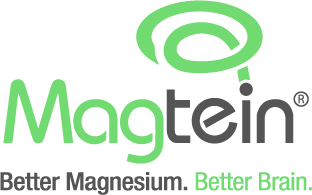The History of Magtein®: From Discovery to Innovation
https://magtein.com/wp-content/uploads/2025/10/Screenshot-2025-10-19-at-1.19.18-PM-1024x679.png 1024 679 Riley Forbes Riley Forbes https://secure.gravatar.com/avatar/3f6c9bbe830133d8a02b6d78dd24a6cf57f35765554b3106fa7c0bce0d8772aa?s=96&d=mm&r=gMagnesium plays a vital role in brain health. However, not all forms of magnesium can easily cross the blood-brain barrier to support cognitive function. Magtein (magnesium L-threonate) was created to overcome this challenge. Understanding its history reveals how scientific innovation can transform a well-known mineral into a brain-targeted supplement.*
The Discovery of Magnesium’s Role in the Brain
Magnesium has long been recognized as an essential mineral involved in more than 300 biochemical reactions throughout the body. Early research emphasized its importance in nerve signaling, synaptic plasticity, and learning.
However, most common forms – such as magnesium oxide or citrate – mainly support muscle and cardiovascular health. They have limited ability to raise magnesium levels in the brain. As research advanced, scientists began searching for new forms of magnesium that could effectively reach the brain to support cognitive performance.
Ultimately, researchers identified magnesium’s limited transport across the blood-brain barrier as a key barrier to its neurological benefits.

The Development of Magnesium L-Threonate
To address the challenge of poor magnesium absorption in the brain, neuroscientists developed magnesium L-threonate. This compound combines magnesium with L-threonic acid, a metabolite of vitamin C that enhances magnesium’s ability to dissolve and move through the body.
This pairing increases solubility, meaning magnesium can dissolve more effectively in water and body fluids. Better solubility improves absorption through the digestive tract and helps magnesium travel across cell and brain membranes. This is especially important for the brain, where magnesium uptake is highly regulated. By improving both solubility and transport, magnesium L-threonate helps magnesium reach brain regions involved in focus, relaxation, and sleep regulation.*
Innovative Mechanism of Action
Human studies have shown that magnesium L-threonate can increase magnesium levels in the brain, thereby supporting essential processes related to learning, memory, and emotional balance.*
- Synaptic plasticity and learning: Magnesium helps activate NMDA (N-methyl-D-aspartate) receptors, which are critical for learning and memory. These receptors regulate calcium flow between neurons, strengthening communication and adaptability. Consequently, balanced NMDA activity promotes effective learning responses and supports overall cognitive function.*
- Neuronal stability: Magnesium also supports steady communication between brain cells by balancing excitatory and calming neurotransmitters. Furthermore, it helps prevent overstimulation and promotes calm, clear signaling. This, in turn, contributes to better focus, emotional steadiness, and cognitive clarity throughout the day.*
- Sleep and emotional balance: Brain magnesium supports relaxation by influencing GABA (gamma-aminobutyric acid) pathways, which help calm neural activity before rest. Additionally, it plays a role in maintaining healthy circadian rhythms that guide natural sleep-wake cycles. Together, these effects support deeper, more restorative sleep and balanced emotional well-being.*
Because of this targeted mechanism, magnesium L-threonate differs from other forms of magnesium that primarily support muscles or energy metabolism. Instead, it delivers magnesium directly to the brain, thereby supporting mental clarity, relaxation, and quality rest as part of a balanced lifestyle.*unique design helps deliver magnesium to the brain, supporting mental clarity, calmness, and restorative rest as part of a balanced lifestyle.*
Key Milestones in Magtein Research
The development of Magtein has been marked by several critical studies demonstrating its efficacy in humans:
- Cognitive benefits: In a trial led by Liu et al., older adults with subjective memory complaints showed significant improvements in working memory, attention, and executive function after 12 weeks of magnesium L-threonate supplementation.
- Sleep and mood support: Hausenblas et al., demonstrated improved sleep quality, deep sleep duration, and reduced irritability in adults using magnesium L-threonate over several weeks.
- Stress regulation: Ongoing clinical trials, including the study Magnesium L-Threonate for Anxiety, Mood, and Sleep Quality in Older Adults (NCT02363634), are investigating the role of brain magnesium in supporting emotional resilience.*
These studies highlight a continuum from discovery to practical application, demonstrating how scientific innovation can translate into meaningful, structure/function benefits for consumers.
Magtein in the Context of Healthy Aging
As people live longer, maintaining brain health and emotional balance becomes increasingly important. Magnesium L-threonate supports this goal by helping maintain healthy brain magnesium levels, which in turn promote:
- Memory retention and learning*
- Stress management and emotional well-being*
- Restorative sleep and next-day focus*
Although research is ongoing, current evidence suggests that Magtein can be part of a science-backed approach to supporting healthy cognitive aging.*

Future Directions and Ongoing Research
Current studies continue to explore how magnesium L-threonate may benefit brain health in broader ways, including:
- Long-term cognitive outcomes in adults over 70
- Potential synergies with other nutrients for brain support
- Mood and stress regulation across diverse populations
Future findings will help refine how magnesium L-threonate fits into holistic strategies for maintaining mental clarity, emotional balance, and sleep quality.*
The Takeaway
The history of Magtein illustrates the evolution of scientific discovery into practical innovation. By addressing the challenge of brain magnesium delivery, magnesium L-threonate supports memory, sleep, and emotional balance in adults.* Its development highlights the intersection of biochemistry, neuroscience, and nutritional science, providing a foundation for healthy aging and cognitive resilience.
References
- Liu G, Weinger JG, Lu ZL, et al. Magnesium-L-threonate supplementation improves memory and attention in older adults with cognitive complaints: a randomized, double-blind, placebo-controlled trial. J Alzheimers Dis. 2016;49(4):971–990.
- Hausenblas HA, Lynch T, Hooper S, et al. Magnesium-L-threonate improves sleep quality and daytime functioning in adults with self-reported sleep problems: a randomized controlled trial. Sleep Med X. 2024;8:100121.
- ClinicalTrials.gov. Magnesium L-Threonate for Anxiety, Mood and Sleep Quality in Older Adults (NCT02363634). https://clinicaltrials.gov/ct2/show/NCT02363634
- Barbagallo M, Dominguez LJ. Magnesium and aging. Curr Pharm Des. 2010;16(7):832–839.
These statements have not been evaluated by the Food and Drug Administration. This product is not intended to diagnose, treat, cure, or prevent any disease.


